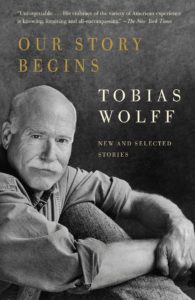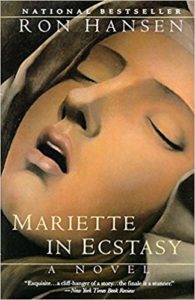
Helen Schulman’s Come with Me is published this month. She shares five books that came out of Stanford with Jane Ciabattari, explaining, “1986 was a great year for me, I got my MFA, I sold my thesis collection, I met my husband, and I was first runner-up for the Stegner fellowship. Although the Stegner folks encouraged me to reapply the following year, I did not, because again I met my husband, and he was based in New York City, where I am from. Ironically, he grew up on the Stanford campus, his dad was the head of publications and his mother was a nurse at the hospital. That was 32 years ago, when it was a university town, and I’ve been visiting Palo Alto ever since, witnessing the growth and domination of the tech industry and observing Silicon Valley up close—hence the inspiration for my new book.

Our Story Begins by Tobias Wolff
I have always been a fan of Tobias Wolff’s short fiction, especially his 2008 collection, Our Story Begins. I bought this book for my old favorites “Hunters in The Snow” and “Bullet to the Brain”, but what really got my attention was what was a then-new story, “Deep Kiss,” published in The New Yorker as “Kiss.” In a way, it is a multiverse story, (my new book is about multiverses) because the protagonist Joe Reed (45) carries on his high school relationship in his own mind for 30 years, even as he marries, becomes a doctor, and has children. He never lets go of his earlier life.
Jane Ciabattari: Joe Reed’s fantasies about his high school girlfriend do create a multiverse in advance of those in Come with Me. What fascinates you about multiverses?
Helen Schulman: As a fiction writer, my life often feels like a series of multiverses. There’s the universe in which I live and work as a professor, a mother, wife, daughter, have friends, adventures, obligations, sorrows and losses, also fun. It’s a fairly stable reality. And then there are the crazy, streaming, invented narratives that are forever playing out inside my head, twisting and turning all day and night—my constant inner companions. To say that both these worlds are equally real to me would suggest madness—luckily I’m not that far gone. But I did find it a relief to read Max Tegmark’s 2014 book Our Mathematical Universe: My Quest for the Ultimate Nature of Reality which explores multiverse theory in a more theoretical way. His thesis (at least as translated through my brain) is that the universe is constantly splitting into infinite realities where we are living out our finite lives. What’s so amazing about Tobias Wolff’s story, is that Joe Reed carries on in two of his “realities” at the same time.
When Breath Becomes Air by Paul Kalanithi
I read Dr. Paul Kalanithi’s memoir When Breath Becomes Air when a young friend of mine was dying. The intimacy Kalanithi shares with his readers as he is dying of cancer is courageous and, for him, seemingly necessary. It helped me when I was trying to understand this young woman’s journey toward death and oddly I found it comforting. There is a character in my book who is a neurosurgeon at Stanford Hospital. I only realized after I stopped writing that I was influenced by Kalanithi.
JC: Kalanithi’s courageous memoir details the experience of facing death. He also describes his undergraduate years at Stanford, and how he came to find his calling as a neurosurgeon. How did you develop your neurosurgeon character?
HS: One of the elements of the book that struck me most was how much Kalanithi felt he’d put his life on ice to complete his formidable years of training. This guy was at the upper echelons of the medical profession and finally he was going to have the job he’d always wanted, but then he got mortally ill. Writing and reading literature were always a siren’s call for him, one he didn’t fully heed until he realized his days were numbered. My neurosurgeon is brilliant, beautiful and wildly successful. She is also a loving, practically perfect mother of three. But in some essential way, she is too big for her son, or at least he felt that way at 17. Kevin is cowed by his parents’ achievements.
Fun fact: I worked my way through grad school as a neurological research assistant to a family friend who had been a key researcher in establishing “brain death” as the end of life (up until then if your heart was still beating you were considered alive). When I was working with him he was writing a book on “brain birth.” His question was: at what point in a developing embryo does a brain spark to life? Ever since, I’ve been fascinated by neurology, and a neurologist was the protagonist of my novel, The Revisionist, published in 1998.

Drinking Coffee Elsewhere by ZZ Packer
I met ZZ Packer before I ever read her marvelous collection, Drinking Coffee Elsewhere, and was so entranced by her lively mind and unbounded curiosity that I instantly bought the book, which did not disappoint in any manner.
JC: I remember reading the title story, about a black undergrad at Yale, in The New Yorker. She’s put into therapy her freshman year, and at one point the therapist says, “You’re pretending.”
“I’m pretending?” I shook my head. “All those years of psych grad,” I said. “And to tell me that?”
“You construct stories about yourself and dish them out—one for you, one for you—” here he reënacted the process, showing me handing out lies as if they were apples.
“Pretending,” is a good description for the process of fiction writing, and Packer is so good at it. What’s your favorite story in the collection?
HS: Coincidentally, that’s the one. Dina, the protagonist, is so lonely and grief-stricken and feeling so miserably out of place—unlike her classmates she comes from a hard-bitten Baltimore neighborhood and she’s just lost her mother—that during a hateful freshman “bonding” exercise, when asked what inanimate object she would be if she were an inanimate object, she replies “a gun.” That’s comment lands her on the shrink’s couch, but it’s an amazingly easy to relate to response under the circumstances that Packer describes. Dina’s isolation is specific to her experience, but the end result feels achingly familiar. What I really admire about Packer’s story is how gutsy she is with time and space; she’s not worried about transitions or how to take you from place to place, she just takes you there so completely, with so much verve and heart, you’re grateful for the plunge.

Time with Children by Elizabeth Tallent
I am a novelist but short stories are my true love, and that’s one of the many reasons I’ve long been a fan of Elizabeth Tallent’s Time with Children, a collection that embraces some of the pleasures of a novel (most of the stories are about three couples whose lives intertwine) but also peppers in unrelated short pieces that capture the pop and ceaseless invention of most story collections.
JC: Most of the stories in Time with Children revolve around the limits of marriage. ”Marriage,” Tallent writes in her story ”Grant of Easement,” ”often seemed to require one who was solid and reliable and one who gave the impression of not quite being bound or faithful, for whom fewer things were givens and about whom a great deal less could safely be taken for granted. That one was Jenny. She wasn’t faithful even now, when they were on the brink of buying the house and so much was riding, in a sense, on fidelity.” Your new novel also explores relationships outside of marriage, adding to idea of a virtual reality portal to multiverses, or paths not taken. How did you develop the scenes in which Amy falls into the multiverses (I almost want to say multiverse nightmares)?
HS: You definitely can say that! The multiverses are nightmarish, they take her to places she never had the courage to go to before, and by peering into different iterations of her own life Amy threatens everything that she presumed to hold dear in the hers and now. It was difficult to figure out how to represent all of this on the page (and the fact that she gets stoned before every session adds to her hallucinations) but I just picked three windows into her life at different times: as a child in the park with her family, as a young woman in New York with her lover, and as a mother in Palo Alto with her sons. A slight turn in direction, a simple choice, and the scenes overflow with significance and life-changing power. And of course there is no way to prove that multiverses she accesses by computer really exist or not. Yep, nightmare sounds exactly right.

Mariette in Ecstasy by Ron Hansen
I’ve read Ron Hansen’s American West books with much admiration but the book of his that stole my heart is the novel Mariette in Ecstasy; it’s about a teenage ecstatic novitiate at the turn of the last century. For this Jewish 20th century reader (it came out 25 years ago) the novel also captured the roiling passions of female youth so intensely that it was both satisfying and unmooring. In this age of auto-fiction, with feverish debate about who can write whose story, it gave me courage to do what fiction has always allowed me to do: go into the hearts and minds of characters I have invented.
JC: Hansen expresses Mariette’s intensity with poetic, contemplative language, in remarkable passages like this one, about the stigmata that afflict Mariette intermittently: “She tries to rub the hot sting from one palm with her thumb but the hurt persists like hate inked on a page. Eventually the sisters rise and slowly pass by Mariette as she sits there for a half hour more, hoarding the pain. She hears something skittering along a joist. She hears the red lanterns on the high altar sigh as flames trickily consume them.” He’s writing intimately about a young woman. What do you think creates the sense of authenticity? And which character most challenged your empathetic skills in your new novel?
HS: I wish I knew how Hansen did it; all I know is that he got it done. I’m going to quote you now quoting him: “the hurt persists like hate inked on a page.” Wow! I can feel that pain in my own body when I read that. And then she sits, “hoarding the pain.” Double wow. It is so complex, the theater and entrapment of Mariette’s desire to be one with God. I think a lot of us at that age crave the fulfillment of ecstasy in almost any shape: be it erotic, spiritual, even violent. One wants to eat life, as one of my student’s once said. I know I myself as a young girl wanted to fill the corners of my being with something, maybe anything, just so I knew I was truly alive. Now, not so much.
I took acting classes in college; I had no gift for it, but boy did I love getting inside someone else’s skin. It’s not hard for me to write from different viewpoints in general. But in this book, Marliyn’s pain just so completely gutted me, I wondered if I could go on writing it. Honestly, what kept me going was Colson Whitehead’s book, Underground Railroad. I kept thinking: Colson lived in that brutal unthinkable landscape for the years it took to write his beautiful book, I can find the bravery for this. It’s a funny way to be influenced by another writer. But essentially that’s what this very column is about.
*
· Previous entries in this series ·

